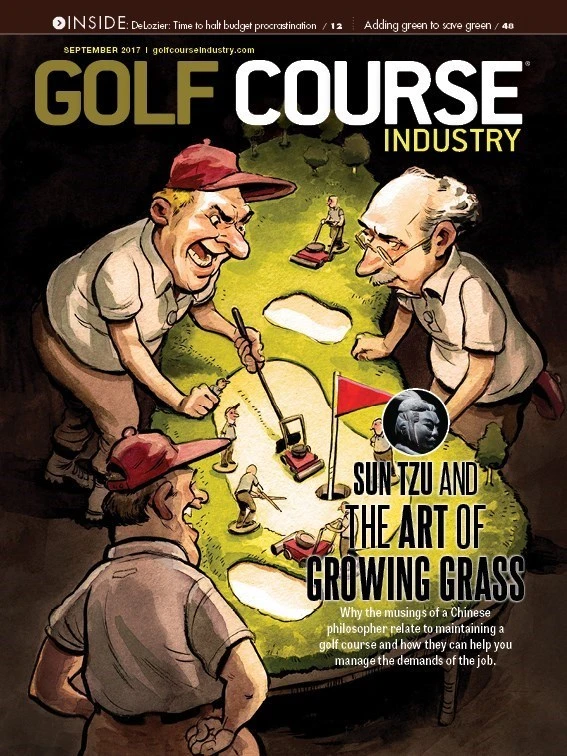By no means did we intend to make light the horrors of war with this month’s cover story. I just feel I need to put that out there before going on. Instead, our intent is to draw a parallel between the preparedness necessary to do battle, whether on the field or the fairway.
We asked our good friend and frequent contributor Anthony Williams (CGCS, and the director of golf course maintenance and landscaping at the Four Seasons Resort Club Dallas at Las Colinas in Irving, Texas) to take some artistic liberties with Sun Tzu’s Art of War – the 2,000-year-old Chinese military treatise on warfare – and his reinterpretation as applied to turf management and what’s needed to be a successful golf course superintendent. On a more personal level, Anthony has often used parts of Sun Tzu’s master work in his seminars covering both martial arts and turfgrass topics with equal reflection for over 30 years.
In this month’s cover story, Anthony identifies seven Sun Tzu quotes that correlate the art of growing grass (or growing people who grow high-quality turfgrass, for that matter). He began balancing a martial arts career with his turf career in the early 1980s. Thirty-five years later he’s still earning a living through the martial arts and the cultivation of high-quality turfgrass.
Sun Tzu was not a micromanager. Instead, he reminds us that we cannot be expected to do everything ourselves, and that we will ultimately depend on our army (staff) to direct tactics and programs and accomplish the physical tasks required in a proper way to ensure success.”
I, myself, read The Art of War nearly a quarter-century ago, primarily because it was on a summer reading list. However, one of my favorite excerpts that Anthony chose to highlight dealt with training as a critical component for success. Anthony, channeling Sun Tzu, says high-quality turfgrass is dependent on the proper training of senior staff such as assistant superintendents, as well as the foot soldiers – the entry-level greenkeepers. Sun Tzu was not a micromanager. Instead, he reminds us that we cannot be expected to do everything ourselves, and that we will ultimately depend on our army (staff) to direct tactics and programs and accomplish the physical tasks required in a proper way to ensure success.
Whether from the back of a Jeep or the front seat of a Cushman, a good leader makes sure his people are prepared to not only do a job, but to achieve success. And while this may not feel the same as directing troops into battle, it has the same level of gravitas. Think about it.

Explore the September 2017 Issue
Check out more from this issue and find your next story to read.
Latest from Golf Course Industry
- From the publisher’s pen: Conscientious of a bigger role
- Bernhard and Company partners with Laguna Golf Phuket
- Terre Blanche showcases environmental stewardship
- VIDEO: Introducing our December issue
- Bernhard and Company introduces Soil Scout
- Nu-Pipe donates to GCSAA Foundation’s Centennial Campaign
- GCSAA enhances golf course BMP tool
- Melrose leadership programs sending 18 to 2026 GCSAA Conference and Trade Show





